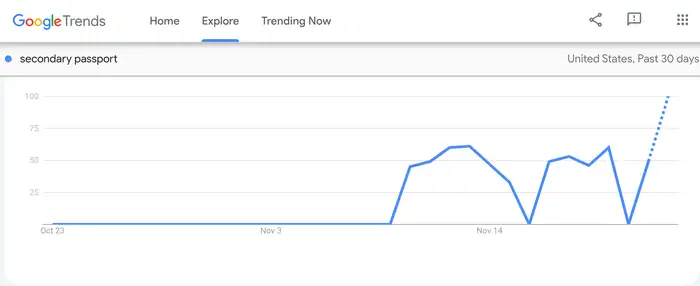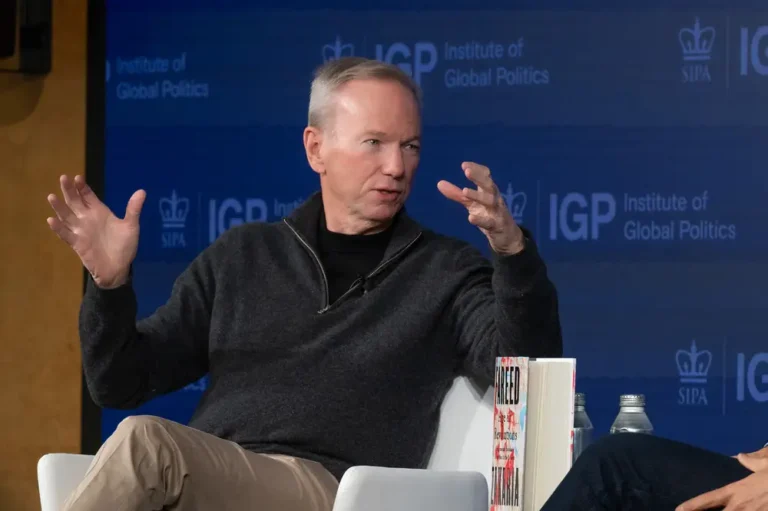Americans’ interest in secondary passports surged after the election

American interest in secondary passports has surged since the election, firms say.
American interest in secondary passports has been on the rise over the last year — and global citizenship firms have reported another surge since Donald Trump’s reelection.
“We are beyond busy at the moment,” Judi Galst, who manages global citizen firm Henley & Partners’ New York office, told B-17 the day after the election.
Phone calls and online inquiries to the firm were “constant” on the morning after Election Day, she said. The firm said it saw a 392% increase in inquiries from US nationals during election week compared to the week prior.
Other firms operating in the space, like Arton Capital, previously told B-17 that it received between 110 and 120 inquiries on the day following the election — about five times its typical number.

US search interest in the term “secondary passports” over the last 30 days.
Google searches for “secondary passports” spiked in the days after.
Clients have new concerns this time around
Reaz Jafri, the CEO of citizenship consulting firm Dasein, said in addition to wanting an option B, clients are wanting to move their assets offshore.
He said people are concerned about Trump’s promise to raise tariffs, and how that could impact the economy and the US dollar.
Leading up to the election, the firm helped a number of clients set up accounts in Europe and move assets offshore, which Jafri said can take about two months.
“It’s not to evade taxes or hide their money, it’s just to keep it out of the reach of the US government,” Jafri said, adding that clients want to ensure their wealth isn’t held solely in US banks if restrictions are put in place.
Jafri also said the election has raised concerns within the LGBTQ+ community.
Since Trump’s reelection, Jafri said he’s had three same-sex couples reach out to him because of worries about what will happen with same-sex marriage. Another client, he said, had already been considering a secondary passport because he has a transgender child and is concerned about their rights under the new administration.
Galst reported similar concerns from clientele.
There has been a “sort of particular trauma in certain conversations” with people who are transgender or gay, Galst said, adding that she has not felt that in conversations with clients in the past.
A surge in interest in second passports after an election is normal
Micha-Rose Emmett, CEO of London-based citizenship consultancy firm CS Global Partners, said she’s been in the industry for nearly 20 years and has been through a number of US elections.
Elections, especially those since 2016, seem to be accompanied by “people getting anxious” about which political party is going to win and searching for alternatives, she told B-17.
“It peaks for a couple of weeks or maybe a couple of months and then everything goes back to normal,” Emmett said.
Concerns about a new administration impact people from both sides of the political spectrum.
Leading up to the 2020 election, Jafri said there was an increase in interest from his clientele’s Republican contingent. They were concerned about Elizabeth Warren or a similar candidate coming into the presidency and the impact it would have from “a tax policy point of view,” he said.
Emmett said during these surges, some people do end up going through with the application process. However, they’ve either been thinking about it for a while or there’s an investment opportunity that coincides with the political situation, she said.
“For super high net worth individuals it’s not purely a political decision,” Emmett said. “I think there are a lot of other factors.”
Secondary passport applications require extensive paperwork and can cost a minimum of $200,000 per application, with the more expensive locations costing $1 million for a couple.
They also don’t happen overnight. Some programs can take two years to process applications.
Galst said that many people seeking these passports are thinking about retirement and creating generational opportunities. Others are looking to diversify their assets. She said one client told her he spent $1 million on insurance — and this was another line item.
“I don’t agree with the headlines that everyone’s leaving the United States,” Galst said, adding that 90% of her clients don’t want to leave the country, they just want an insurance policy.
Galt said she anticipates a lot of conversations happening over Thanksgiving, especially since these decisions can impact a family.






